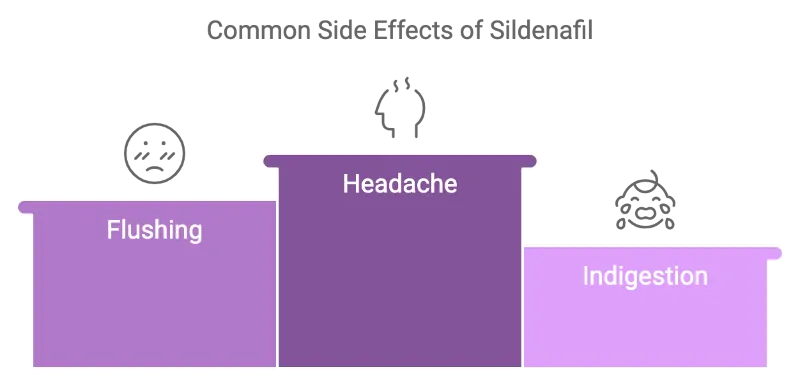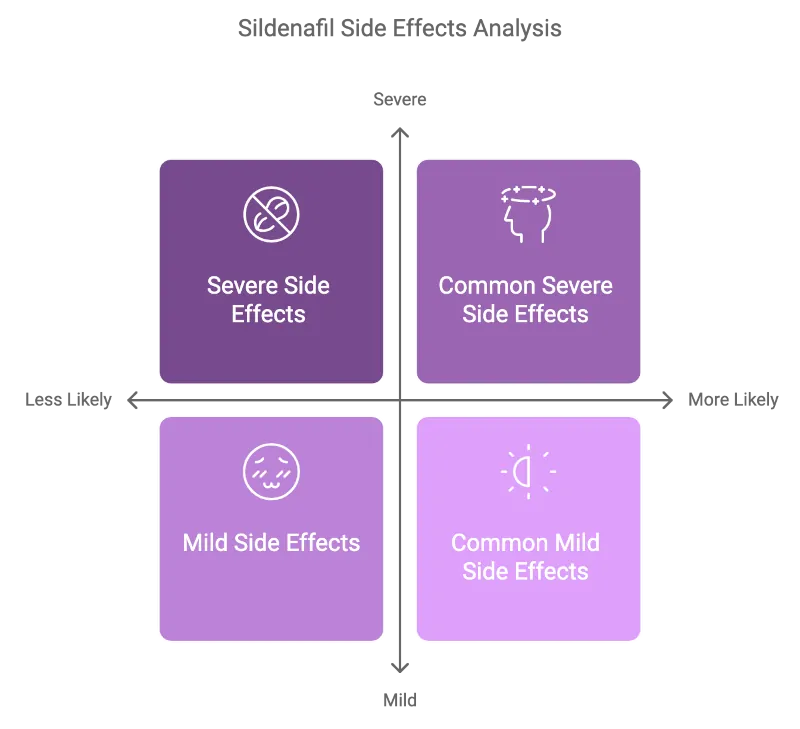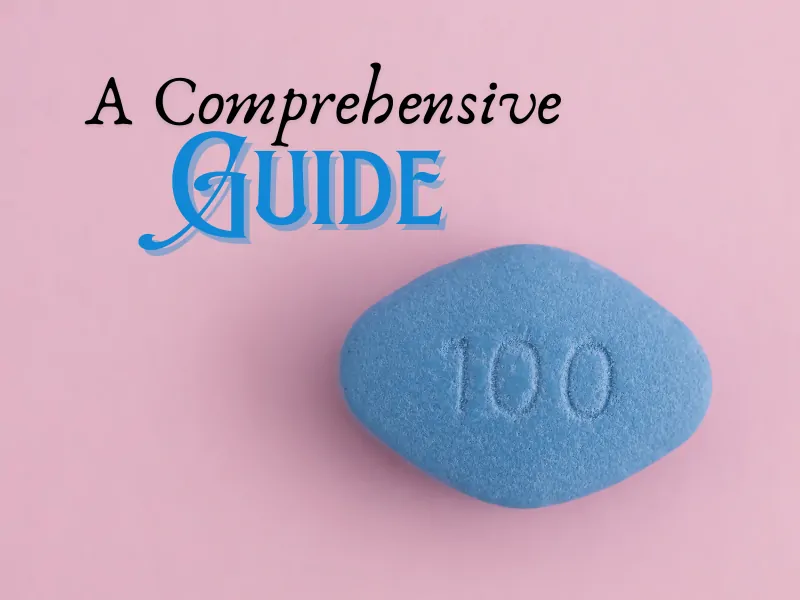Sildenafil, commonly known by the brand name Viagra, is a widely recognized medication used to treat erectile dysfunction (ED) in men. It works by increasing blood flow to the penis, making it easier to achieve and maintain an erection. While it’s generally safe and effective, it’s important to be aware of potential side effects.

How Sildenafil Works
Sildenafil belongs to a class of drugs called phosphodiesterase-5 (PDE5) inhibitors. These drugs work by blocking the action of an enzyme called PDE5, which regulates blood flow in the penis. By inhibiting PDE5, sildenafil helps relax the blood vessels in the penis, allowing for increased blood flow when a man is sexually aroused.
Common Side Effects
Most men who take sildenafil experience mild and temporary side effects. These can include:

- Headache: This is the most frequently reported side effect.
- Flushing: A feeling of warmth and redness in the face or neck.
- Indigestion: May include upset stomach, heartburn, or nausea.
- Nasal congestion: A stuffy nose.
- Visual disturbances: Changes in vision such as blurred vision, increased sensitivity to light, or a blue tinge to vision.
- Dizziness: Feeling lightheaded or unsteady.
- Muscle aches: Pain in the back, arms, or legs.
Serious Side Effects
While rare, sildenafil can cause serious side effects. It’s crucial to seek immediate medical attention if you experience any of the following:
- Priapism: A persistent and painful erection lasting more than four hours. This condition can cause permanent damage if not treated promptly.
- Sudden vision loss: Loss of vision in one or both eyes.
- Sudden hearing loss: May be accompanied by ringing in the ears (tinnitus) and dizziness.
- Severe allergic reactions: Symptoms may include rash, hives, itching, swelling of the face, lips, tongue, or throat, difficulty breathing, and wheezing.
Less Common Side Effects
Other less frequently reported side effects include:
- Sleep disturbances
- Nosebleeds
- Diarrhea
- Rash
Important Considerations
- Individual variation: Not everyone experiences side effects. Many men take sildenafil without any problems.
- Mild and temporary: Side effects are often mild and temporary, subsiding as your body adjusts to the medication.
- Alcohol interaction: Excessive alcohol consumption while taking sildenafil can increase the risk of side effects, particularly dizziness and low blood pressure.

Always Consult Your Doctor
If you have any concerns about side effects or if you experience any unusual symptoms while taking sildenafil, talk to your doctor or pharmacist. They can help you manage side effects and determine if sildenafil is the right medication for you.
Remember: This blog post is for informational purposes only and does not constitute medical advice. Always consult with a qualified healthcare professional before starting any new medication or if you have any questions or concerns about your health.
Sources
- NHS: Side effects of sildenafil
- Mayo Clinic: Sildenafil (oral route)
- Medical News Today: Sildenafil (oral tablet) side effects: What to do about them
- WebMD: Sildenafil: Uses, Side Effects, Interactions, Pictures, Warnings & Dosing
- Drugs.com: Sildenafil Side Effects: Common, Severe, Long Term
Disclaimer: The information above is for general knowledge and informational purposes only, and does not constitute medical advice. It is essential to consult with a qualified healthcare professional for any health concerns or before making any decisions related to your health or treatment.
FAQ about Sildenafil (Viagra)
Q: How long does sildenafil last?
A: Sildenafil usually starts to work within 30 to 60 minutes, and its effects can last for about 4 hours. However, the duration of effect can vary depending on individual factors such as age, dosage, and overall health.
Q: Can I take sildenafil with other medications?
A: It’s crucial to inform your doctor about all other medications you are taking, including over-the-counter drugs and herbal supplements. Some medications can interact with sildenafil, potentially causing adverse reactions. For example, taking sildenafil with nitrates (often used for chest pain) can lead to a dangerous drop in blood pressure.
Q: Who should not take sildenafil?
A: Sildenafil is not suitable for everyone. Individuals with certain health conditions, such as severe heart disease, uncontrolled high blood pressure, or a history of stroke, may be advised against taking sildenafil. It’s essential to discuss your medical history with your doctor to determine if sildenafil is safe for you.
Q: Can I take sildenafil if I don’t have ED?
A: Sildenafil is primarily prescribed for erectile dysfunction. However, it is also approved for the treatment of pulmonary arterial hypertension (PAH), a condition affecting the arteries in the lungs. It’s not recommended to take sildenafil without a medical reason.
Q: What should I do if sildenafil doesn’t work for me?
A: If sildenafil is not effective, talk to your doctor. They may adjust your dosage or suggest alternative treatments for ED, such as other medications, lifestyle changes, or counseling.
Q: Are there any natural alternatives to sildenafil?
A: Some lifestyle changes, such as regular exercise, a healthy diet, stress management, and quitting smoking, can improve erectile function. Additionally, some men may find benefit from natural remedies like ginseng or L-arginine. However, it’s essential to discuss these options with your doctor before trying them, as they may not be suitable for everyone or may interact with other medications.
Remember: This FAQ provides general information only and does not substitute for professional medical advice. Always consult your doctor or pharmacist for personalized guidance regarding your specific situation.


